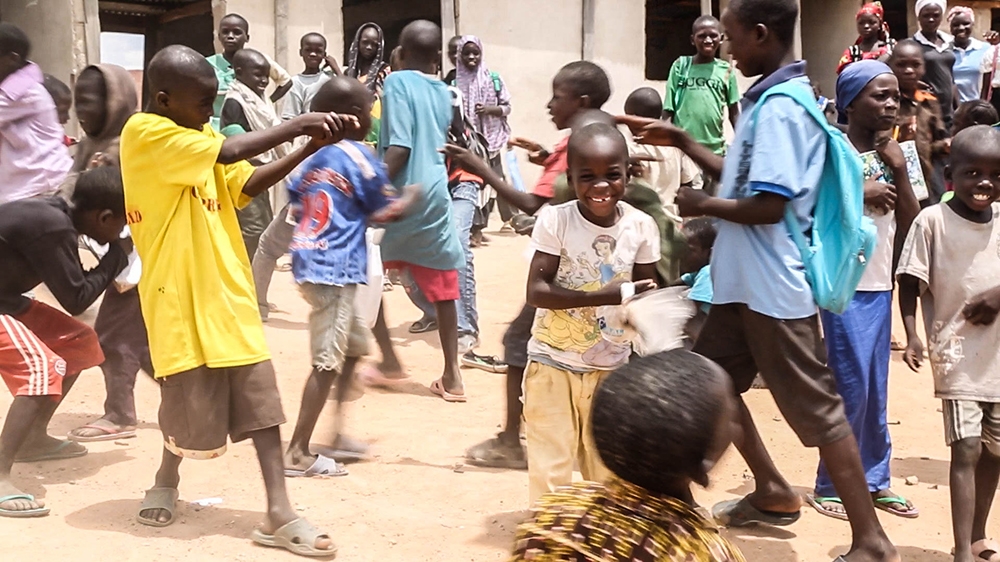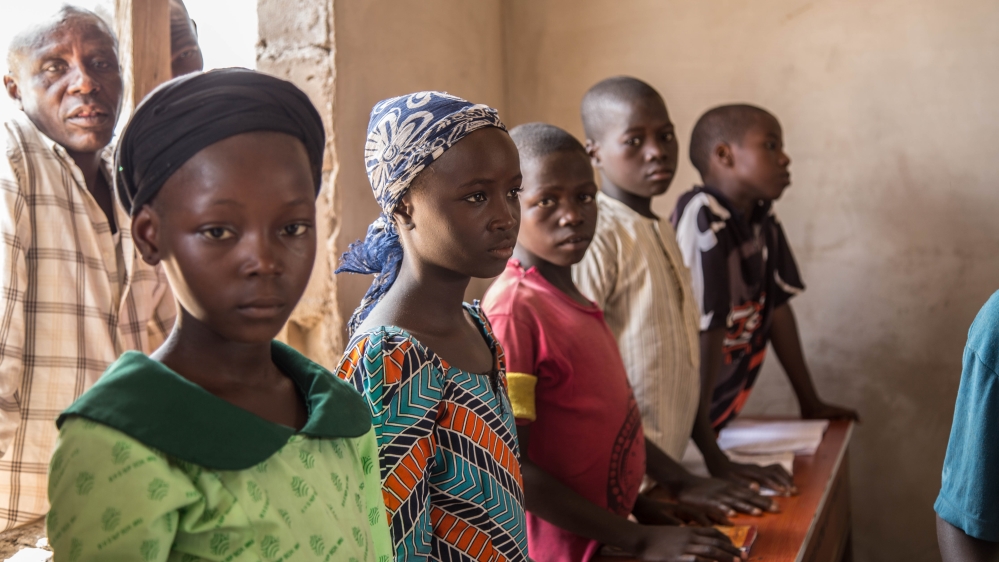
Yola, Nigeria – The field is wide and scorching under dry midday heat. Dozens of children kick up the sand underneath their sandals.
Their shrieks echo as they roll their heads back in carefree laughter. They’re playing, but not with toys or balls.
They are playing a game called “Boko Haram versus soja (soldier)”.
They scamper around screaming, “shoot!”, ramming their fingers into each other’s bodies. Their pointed fingertips are supposed to be the barrels of rifles or blade of swords.
They are pretending to kill each other.
Some “die”, falling over like felled trees.
One child collapses with his hand pressed over his heart as imaginary blood gushes out.
A tall boy jumps over the “dead” body and runs into another with a yellow t-shirt, who aims straight for his head.
“Boom!” the boy shouts, a gunshot.
This is playtime at a private primary school organised by a local NGO called Education Must Continue Initiative (EMCI) in Yola, the capital of Adamawa state in northeastern Nigeria.
All of the children are now displaced after fleeing their home communities to escape from Boko Haram.
‘I saw Boko Haram chop my grandfather’s head’
These children have seen the brutality of the armed group firsthand.
“Boko Haram, I see them use knife, chop my grandfather’s head,” said Ibrahim Daniel, a 13-year-old boy from Gwoza in neighbouring Borno State.
Gwoza was, and is still, a notorious hideout for the fighters. Boko Haram captured the town of nearly 300,000, in August 2014, and declared it the headquarters of what it called its Islamic Caliphate.
The group’s black flags were mounted around the town and underneath them, Boko Haram members executed anyone who failed to obey their rules, dumping corpses in wells and streams.
Hundreds hid in the Gwoza Hills, a set of rocky outcrops on the northeastern end of the volcanic Mandara Mountains that straddle the Nigerian-Cameroonian border.
 |
| Children play ‘Boko Haram versus soja’ in a school field in Yola, Nigeria [Chika Oduah/Al Jazeera] |
The Nigerian army flushed Boko Haram out of Gwoza nine months later, but Daniel is still too afraid to go back.
“The Boko Haram is something that you won’t like to see,” the young teenager says in a gruff voice.
Speaking in Nigerian slang English, he continues: “I’d like to be a soldier because anything that them [Boko Haram] do, I’d like to do back to them. If me, I see them, me I go carry them. Me I kill am.”
The other kids huddle around Daniel, laughing at his last remark about killing Boko Haram. Many of them want to become soldiers, too.
They have seen the fighters invade their villages and they want revenge.
“I can help government. I can help my parents with being soja,” says Chinda John in the same slang, sitting beside Daniel.
Across the Lake Chad region, where Boko Haram’s campaign is approaching its tenth year, a generation of young people are dreaming of becoming soldiers, nurturing their hopes of inflicting bloody vengeance on the group for its atrocities, which includes killing at least 30,000 people, kidnapping thousands and setting ablaze untold numbers of villages.
Operating on its manifesto that condemns Western education, Boko Haram has destroyed nearly 1,400 Western-style schools, killed more than 2,000 teachers and caused $9bn worth of destruction.
The transnational group carries out attacks in Nigeria, Cameroon, Niger, Chad and in the islands on Lake Chad. A faction of the group boasts of an affiliation with the Islamic State of Iraq and the Levant (ISIL, also known as ISIS).
Dreams of being a soldier
The growing thirst for revenge from children worries Rebecca Gadzama, the cofounder of EMCI.
She launched the NGO with her husband in the wake of the February 2014 Chibok Girls abduction. Reaching more than 1,600 children. EMCI has set up two schools for internally displaced children and partners with six existing schools in central Nigeria.
She stops by to visit the EMCI school in Yola, entering a math class where Daniel, John and other students are learning about ratios. When she walks into the classroom everyone stands up.
“Good morning, grandmother,” they say in unison.
“How are you?” Gadzama replies.
She stands in the doorframe and asks how they’re doing, and how many of them want to become doctors. One student raises his hand.
“Who wants to be an economist? I am one,” she asks. No one raises a hand.
“Who wants to be a soldier?”
Most of the students in the classroom raise their hand while giggling.
Gadzama lifts her head, looking around the room. Then she speaks again, gently yet firm.
“Before you grow up, you need to learn that even if you kill Boko Haram, will it bring back what you lost? Will it change what has happened to you? How many lost their parents to Boko Haram? How many people lost their loved ones?” she asks the children.
Everyone looks around. The room buzzes with tension. One by one, hands go up, one in the rear, another by the window, the kid sitting by the teacher, also.
‘They need psycho-social support’
Boko Haram’s campaign has had an acute impact on children.
Some of the nine-year-old students have been hearing the words Boko Haram ever since they were born.
Out of the 2.6 million people who fled their homes in fear of Boko Haram, 1.4 million of them were children, according to the United Nations Children’s Fund (UNICEF).
The agency also reports that nearly one out of four suicide bombers is a child.
 |
| Across northeastern Nigeria, millions of children live with mental trauma after witnessing Boko Haram invade their villages and kill their relatives [Chika Oduah/Al Jazeera] |
For many children in the area, fear is a daily part of their lives. But the fear is often hidden under complex emotional layers.
“Some children are very shy,” said Marzia Vigliaroni from the Italian organisation Cooperazione Internazionale. The group partnered with UNICEF in Niger to help rehabilitate local communities attacked by Boko Haram. “They won’t speak or participate in our activities; they need psychosocial support.”
Apart from dreaming of killing Boko Haram, children draw pictures of them, too.
In a 2015 UNICEF report called Missing Childhoods, Vigliaroni said: “We ask them to make drawings of their experience during the attack. They draw people with slit throats and people drowning in the river.”
Danladi Saleh, a medical doctor from Chibok where Boko Haram carried out its most infamous kidnapping, said many children see the violence as something fun that they want to be a part of.
“With gunshots and explosions, naturally you will find people running away and hiding but I have observed children in this part of Nigeria running with joy and jubilation towards it, the violence. It is highly abnormal. They want to see the explosion; they want to see Boko Haram; they want to see the fight. So the whole thing is fun for them,” Saleh explains to Al Jazeera.
For years, Saleh has helped to coordinate psychosocial counselling in the area.
 |
| Aid workers have observed displaced children drawing bloody depictions of what they have seen. This is a drawing from a child named Mustapha [Courtesy: Unicef] |
When a volunteer counter-Boko Haram civilian group called the Civilian Joint Task Force (CJTF) emerged in the northeastern Nigerian city of Maiduguri – where Boko Haram began – in 2013, adolescents eagerly joined. Amateur videos of CJTF operations showed adolescents and teenagers beating people with guns.
Saleh said he remembers what he saw on the day when the CFTF had successfully repelled Boko Haram when the fighters tried to enter Maiduguri.
“You can see a child who looked to be 12 years old carrying the head of a Boko Haram member, the head of a human being, a Boko Haram member,” Saleh explains. “Imagine the future of a child who is carrying a human head and the psychological impact of that child. What will his future look like?”
The CJTF signed an agreement with UNICEF in 2017 to prevent children from participating.
Rehabilitation, psychosocial support and de-radicalisation programmes are cropping up, but mental trauma is often misunderstood, particularly in children.
It is not an issue of fighting back. It’s an issue of how do we get over this? How do we become one again because some of the guys in the Boko Haram are also children. When will it stop?”
Rebecca Gadzama, cofounder of Education Must Continue Initiative
Nigeria’s war against Boko Haram continues with no end in the near future. In recent weeks, the fighters have killed Nigerian security forces and stolen military equipment. But the government has downplayed these incidents, opting to present stories of military might and success against Boko Haram.
In this false narrative, children are growing up believing that being a soldier means being invincible, observers have noted.
Back in Yola, Gadzama winces at the sight of students wielding imaginary guns and throwing bombs.
“It is not an issue of fighting back. It’s an issue of how do we get over this? How do we become one again because [some of] the guys in the Boko Haram are also children,” Gadzama says. “When will it stop?”
 |
| Students at the Education Must Continue Initaitive school in Yola raise their hands when asked if they want to become soldiers [Chika Oduah/Al Jazeera] |












